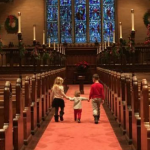
Below are some written responses to questions asked in a Q&R session last fall at GRACEPOINTE Church in Franklin, TN. A link to the full video is provided at the end of this article.
Question 1: What do you do when prayers and religious rituals become overdone and meaningless for you but your kids still ask for them?
Here’s what NOT to do – don’t shut their spiritual inquiry down. (This will be a theme repeated in this post). Now, ritual for the sake of ritual isn’t terribly helpful. Theologian Paul Tillich says when religious symbols/rituals cease pointing to our “ultimate concern(s),” they become idols.
Rituals exist for a reason – they are so important to our spiritual journeys and growth because they give us images and words to put to our otherwise nebulous theological musings. Good religious symbols can draw us into a fuller awareness of the divine, of one another, and of ourselves – so don’t be too quick to write them all off. But if traditional practices have lost their spark, make new ones. Don’t be afraid to be creative with your family’s spirituality. My friend and co-worker Melissa Greene addressed her son’s request for nighttime prayers (because he was scared), by helping him to focus on his breathing and imagine a river: a river that refreshes and restores and brings peace. She told her son to imagine his scary thoughts as leaves on the river, being carried far, far away. “God is the river,” she told them. Prayer doesn’t have to take the form of “Dear God, please make ‘x’ happen” to be impactful and formative.
Another friend addressed their child’s request for prayer by spending a few moments expressing what he loved about each of his children. They, in turn, expressed what they loved most about each other. Their prayer was spent in awareness of one another’s belovedness and I can’t imagine a more beautiful prayer than that.
Question 2: What do we do when our kids come to fundie conclusions about God?
A dad brought this question up at our Q&R because his son was determined that God was punishing him for his mistakes – that everything negative that happened in his life was a result of God’s judgement. Here’s the trick – fundamentalism can manifest on both sides of the isle. So do we enforce our own ideas, just like our parents did with us? Or do we give them latitude and freedom to explore, even if their conclusions are the ones we wanted to so desperately shield them from?
I’ll say it again – don’t squash their spiritual inquiry. If your child is asking questions about God – engage, engage, engage. The worst thing you can do for a child’s spiritual development is to shut down their questions, concerns, or ideas.
That said – harmful ideas are harmful. Period. What so many of us in this UnFundie community are scarred by are damaging, fear-based views of God – just like the ideas of this child. We know that these beliefs are harmful and unhealthy. They were also given to us with no alternatives and usually no space to ask questions. So, to avoid being an unfundie parent in a situation like this one – allow space for questions and guide your children toward healthy spiritual ideas. If your child is coming to harmful conclusions about God, I think it’s okay to pick him back up and say, “Son, can I ask why you think that? Did someone tell you that?” and then “You know, I used to believe that, too. But as I got older I realized that God isn’t so much like a judge in the sky who makes bad and good things happen. But rather, God is more like…” Go with them on a spiritual journey and help them along – that’s the role of a parent in every other aspect of life. Spirituality should be no exception.
Also, children derive their understanding of God directly from their parents. Meaning – whatever type of parent we are will inform their notion of God. So AS a parent, the best way to steer them from harmful ideas of the Divine is to model for them what you believe God is like. That’s where they’ll get healthier God-concepts. If you can be the parent who picks your kid up when he falls down, hugs her when she’s discouraged, laughs at their jokes – you’ll help them to understand more of who/what God is.
Question 3: How do we equip our children with practical ways to avoid being torn down by opposition?
This question was posed in regard to differing religious opinions being that we are an incredibly theologically progressive church in the middle of the buckle of the Bible belt.
Teach your children about self-respect and respecting others. Remind them early and often that “people access God in all sorts of ways” and that sometimes other people’s ways don’t leave much space for new ideas. As frustrating as that can be, we can still be respectful of their boundaries and respect our own selves enough to know that we will be okay if so-and-so doesn’t see it our way.
We also talked a bit in this Q&R about how so much of fundamentalist ideas stem from an inherently fear-based religious system. While I don’t think you need to go into all of that with your kids, I do think the practice of empathy is something we can instill in our children. Helping them to see other people’s fears and hurts will do wonders in these moments of conflict. If your fifth grader can see that their friend is afraid of God, imagine the kind of conversation can come out of that awareness. “Ike, I’m sorry if something I’ve said hurt you. But I hope you know that I see God in you and that you’re loved.” Rather than, “Nuh uh – you don’t know what you’re talking about. God isn’t a scary guy in the sky! God is everywhere!” When empathy is at play, conversations aren’t competitions. They are loving exchanges and THAT’S what I think we should be equipping our children to do.
Of course – we also need to empower our children to know when to walk away. Sometimes, these conversations are impossible to have in a given moment (I’m suuuuuuure none of the adults reading this have had that experience). It’s okay to say, “Hey, I don’t think I can have this conversation right now. Let’s talk about this another day when we’re more calm.” Help your children to know their limits.
Kids & Theology from GRACEPOINTE CHURCH on Vimeo.












